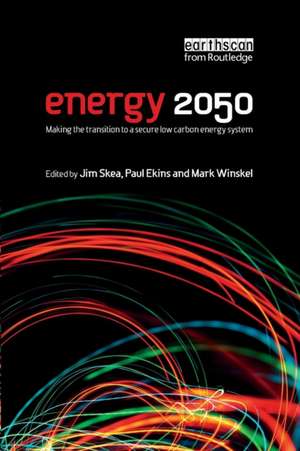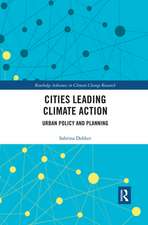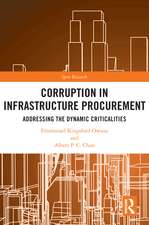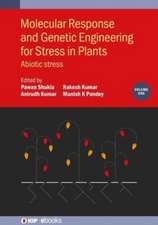Energy 2050: Making the Transition to a Secure Low-Carbon Energy System
Autor Jim Skea, Paul Ekins, Mark Winskelen Limba Engleză Paperback – 26 noi 2015
Energy 2050 begins by exploring the evolution of the UK energy system over recent decades: the trends, technologies and environmental impacts related to energy use, and the structures and institutions of governance that have influenced this evolution. It then moves on to changes in energy policy to emphasise decarbonization and resilience, and introduce the approach to scenarios and modelling used in the rest of the book. Later chapters explore different aspects of the uncertainties that may enable or constrain the creation of a low-carbon, resilient UK energy system, related to accelerated technology development, the creation of an infrastructure to support de-centralized energy and microgeneration, to lifestyle and behaviour change, and to public attitudes to wider environmental impacts associated with energy system change.
| Toate formatele și edițiile | Preț | Express |
|---|---|---|
| Paperback (1) | 416.22 lei 6-8 săpt. | |
| Taylor & Francis – 26 noi 2015 | 416.22 lei 6-8 săpt. | |
| Hardback (1) | 1008.97 lei 6-8 săpt. | |
| Taylor & Francis – 21 dec 2010 | 1008.97 lei 6-8 săpt. |
Preț: 416.22 lei
Nou
Puncte Express: 624
Preț estimativ în valută:
79.65€ • 82.85$ • 65.76£
79.65€ • 82.85$ • 65.76£
Carte tipărită la comandă
Livrare economică 15-29 aprilie
Preluare comenzi: 021 569.72.76
Specificații
ISBN-13: 9781138968790
ISBN-10: 113896879X
Pagini: 408
Dimensiuni: 156 x 234 x 21 mm
Greutate: 0.45 kg
Ediția:1
Editura: Taylor & Francis
Colecția Routledge
Locul publicării:Oxford, United Kingdom
ISBN-10: 113896879X
Pagini: 408
Dimensiuni: 156 x 234 x 21 mm
Greutate: 0.45 kg
Ediția:1
Editura: Taylor & Francis
Colecția Routledge
Locul publicării:Oxford, United Kingdom
Cuprins
1. Introduction 2. UK Energy in an Era of Globalisation: Trends, Technologies and Environmental Impacts3. UK Energy Policy and Institutions4. Energy Futures: the Challenges of Decarbonisation and Security of Supply5. Pathways to a Low Carbon Economy6. A Resilient Energy System7. Accelerating New Technologies: the Role of Research and Innovation8. A Change of Scale? Prospects for Distributed Energy Resources9. The Way We Live from Now On: Lifestyle and Energy Consumption10. Not Just Climate Change: other Social and Environmental Perspectives11. UK Energy in an Uncertain World12: Putting it All Together: Implications for Policy and Action
Notă biografică
Jim Skea is Professor of Sustainable Energy at Imperial College London and Research Director of the Energy Research Centre. His research interests are in energy, climate change and technological innovation. Jim is a founding member of the UK's Committee on Climate Change and a Vice-Chair of the Intergovernmental Panel on Climate Change Working Group III (climate change mitigation). Paul Ekins has a PhD in economics from the University of London and is a Co-Director of the UK Energy Research Centre, heading its Energy Systems theme. He is Professor of Energy and Environment Policy at the UCL Energy Institute, University College London. His academic work focuses on the conditions and policies for achieving an environmentally sustainable economy, with a special focus on energy technologies and policy, innovation, the role of economic instruments, sustainability assessment and environment and trade.Mark Winskel is Research Co-ordinator of the UK Energy Research Centre, and Senior Research Fellow in the Institute for Energy Systems, University of Edinburgh. He has held a number of research grant awards on innovation in energy systems. He has an interdisciplinary education across the natural, environmental and social sciences, and his PhD addressed technological change in the UK power supply sector.
Recenzii
"A very significant book indeed - it ought to have a major impact." – Andy Gouldson, University of Leeds, and Director, ESRC Centre for Climate Change Economics & Policy
"Relevant, reliable, rigorous, robust - this book examines the debate on the prospects for a low carbon, energy secure economy and society from every angle. It points us in the right direction and it gives us grounds for optimism - technologically, economically, politically - that we can indeed make the transition. This is a very significant book indeed - it ought to have a major impact." – Andy Gouldson, Professor of Sustainability Research the School of Earth and Environment, University of Leeds and Director, ESRC Centre for Climate Change Economics & Policy
"The issues tackled in Energy 2050 are crucial for the UK and other countries to address and I welcome this publication as an important contribution to the energy security and climate change debate. The collaborative approach taken by UKERC has brought together researchers from a range of disciplines and with different perspectives to try and answer some of the key energy policy issues facing the UK." – Nobuo Tanaka, Executive Director, International Energy Agency
"The authors should be commended in presenting the challenges and opportunities of energy transformations in this very informative and fascinating collaborative book." – Nebojsa Nakicenovic, Deputy Director, International Institute for Applied Systems Analysis (IIASA), Vienna University of Technology, and Director, Global Energy Assessment (GEA)
"This book neither offers nor advocates a single pathway to 2050 - by explaining the factors that will shape our future UK energy system and the interaction between them, it invites an informed assessment of our options and should enable better decision making in the face of uncertainty." – Tom Delay, CEO, the Carbon Trust
"After a decade or more of previous studies, this important book now provides the authoritative analysis of pathways to a sustainable energy future for the UK. Using new modelling results to investigate the balance between economic, environmental and security objectives, it makes a strong case for urgent and sustained policy intervention." – Nick Hartley, Senior Advisor, Oxera
"The coherent, cohesive, and comprehensive structure of the book distinguishes it from many other collaborative works in the field." – Patrick Reynaud, Senior Manager, Centre for International Sustainable Development Law
"Relevant, reliable, rigorous, robust - this book examines the debate on the prospects for a low carbon, energy secure economy and society from every angle. It points us in the right direction and it gives us grounds for optimism - technologically, economically, politically - that we can indeed make the transition. This is a very significant book indeed - it ought to have a major impact." – Andy Gouldson, Professor of Sustainability Research the School of Earth and Environment, University of Leeds and Director, ESRC Centre for Climate Change Economics & Policy
"The issues tackled in Energy 2050 are crucial for the UK and other countries to address and I welcome this publication as an important contribution to the energy security and climate change debate. The collaborative approach taken by UKERC has brought together researchers from a range of disciplines and with different perspectives to try and answer some of the key energy policy issues facing the UK." – Nobuo Tanaka, Executive Director, International Energy Agency
"The authors should be commended in presenting the challenges and opportunities of energy transformations in this very informative and fascinating collaborative book." – Nebojsa Nakicenovic, Deputy Director, International Institute for Applied Systems Analysis (IIASA), Vienna University of Technology, and Director, Global Energy Assessment (GEA)
"This book neither offers nor advocates a single pathway to 2050 - by explaining the factors that will shape our future UK energy system and the interaction between them, it invites an informed assessment of our options and should enable better decision making in the face of uncertainty." – Tom Delay, CEO, the Carbon Trust
"After a decade or more of previous studies, this important book now provides the authoritative analysis of pathways to a sustainable energy future for the UK. Using new modelling results to investigate the balance between economic, environmental and security objectives, it makes a strong case for urgent and sustained policy intervention." – Nick Hartley, Senior Advisor, Oxera
"The coherent, cohesive, and comprehensive structure of the book distinguishes it from many other collaborative works in the field." – Patrick Reynaud, Senior Manager, Centre for International Sustainable Development Law



















